VOTER GUIDE
 On Tuesday, June 30, Faith in Public Life and Interfaith Power & Light released a voter reflection guide endorsed by prominent national faith groups and religious leaders. The guide, Democracy, Values & the 2020 Election, addresses urgent issues in the election, including voting rights, climate change, systemic racism in the criminal justice system, healthcare and immigration. The guide, which will be distributed across the country for discussion in diverse faith communities, includes topics for reflection and sample questions to ask candidates Download Full Guide Here
On Tuesday, June 30, Faith in Public Life and Interfaith Power & Light released a voter reflection guide endorsed by prominent national faith groups and religious leaders. The guide, Democracy, Values & the 2020 Election, addresses urgent issues in the election, including voting rights, climate change, systemic racism in the criminal justice system, healthcare and immigration. The guide, which will be distributed across the country for discussion in diverse faith communities, includes topics for reflection and sample questions to ask candidates Download Full Guide Here
Download Spanish-language version of the guide, Democracia, Valores y las Elecciones de 2020
Issues and Questions
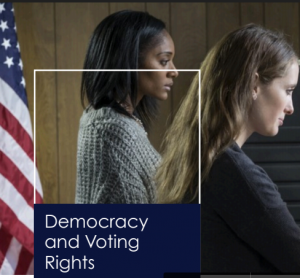 Democracy and Voting Rights (Page 1)
Democracy and Voting Rights (Page 1)
This election is more than a choice between parties and ideologies. An even more fundamental question is at stake: Can we preserve democracy in the face of serious threats to fair elections and fundamental rights?
Questions for Reflection and Candidates
- How do you see democratic values at risk today?
- How do systemic barriers to voting undermine our most sacred democratic values?
- How can your faith community better advocate for stronger voter protections at the state and local level?
- As a candidate, what are your specific plans for protecting and strengthening voting rights?
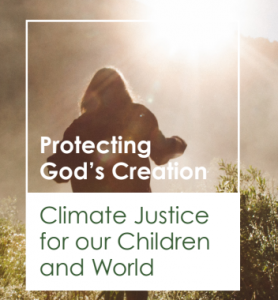 Protecting God’s Creation Climate Justice for our Children and World (Page 2)
Protecting God’s Creation Climate Justice for our Children and World (Page 2)
As people of faith, we believe that responding to the urgent threat of climate change is essential to caring for God’s creation and loving our neighbors. Human activity, primarily the burning of fossil fuels for energy, has thrown
nature out of balance, polluted the air, driven thousands of species of God’s creatures to extinction, intensified catastrophic events such as wildfires and hurricanes, and threatened the lives and livelihoods of our most vulnerable brothers, sisters and neighbors around the world. Scientists tell us we have less than a decade to avoid even more catastrophic consequences.
The United States has a unique responsibility to show moral and political leadership:
- Transitioning our economy away from polluting fossil fuels toward 100% clean energy.
- Honoring the emissions-reduction commitments our nation made at the UN Conference on Climate Change in Paris in 2015, and taking additional actions needed to avert catastrophic global warming.
- Assisting developing nations— who are least responsible for climate change but most impacted by it — in coping with threats such as increased droughts, disease, and sea-level rise by sharing technology and financial support.
Questions for Reflection and Candidates
- What does your faith teach about our responsibilities for the Earth and to others? How are they interdependent?
- Has your faith community made an effort to cut emissions, save energy, or practice environmental stewardship?
- As a candidate, what specific policies do you support to protect God’s Creation and secure a safe climate for our children and future generations?
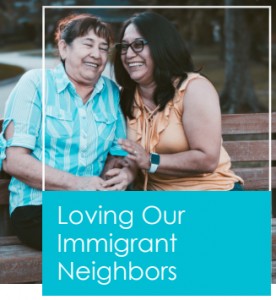 Loving Our Immigrant Neighbors (Page 4)
Loving Our Immigrant Neighbors (Page 4)
Scripture repeatedly makes clear that immigrants must be treated with dignity. Policies that rip children from their parents’ arms, lock people away in inhumane conditions, and ban desperate families from entering the country
should keep us awake at night. As people of faith, we believe that the way we treat our immigrant neighbors is a sign of how we treat God.
Questions for Reflection and Candidates
- How can we replace immoral immigration policies that tear families apart and cause trauma with an immigration system that values families and affirms the dignity of allv people?
- What can we do to heal the wounds inflicted on immigrant communities by political rhetoric that portrays them as a dangerous “other?”
- If there are immigrants in our community who are feeling isolated and under threat, how can we show support and build connections?
- As a candidate, what will you do to defend the dignity of all immigrants, and how will you further policies that keep families together?
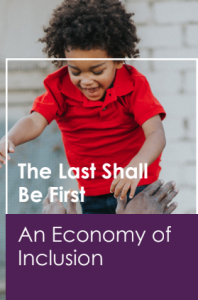 The Last Shall Be First An Economy of Inclusion (Page 5)
The Last Shall Be First An Economy of Inclusion (Page 5)
Our economic systems should work for all Americans, not only the wealthiest few. This is a matter of justice and
human dignity. All religious traditions recognize that charity is essential to care for the most vulnerable, but helping our neighbors in poverty also compels us to address its root causes. “Charity is no substitute for justice withheld,” St. Augustine observed centuries ago.
Questions for Reflection and Candidates
- What can we do to ensure that all Americans are able to provide for their families and live with security and dignity?
- How do we create a just tax system that is fair to all Americans, including working families who are trapped in poverty?
- Why does the United States lag behind most developed countries when it comes to providing paid sick leave and paid family leave?
- As a candidate, what are your specific plans to ensure workers have living wages and economic security while the coronavirus pandemic continues, as well as for the long term?
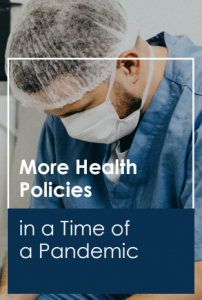 More Health Policies in a Time of a Pandemic (Page 7)
More Health Policies in a Time of a Pandemic (Page 7)
Despite our nation’s stated values of life and equality, the United States is the only industrialized country in the world that does not guarantee its residents universal access to health care. This is a failure of political and moral imagination – especially in a time of pandemic.
Questions for Reflection and Candidates
- How can people of faith be most effective in using our stories, congregations and power to advocate for health care reform?
- What do you struggle with the most when it comes to our healthcare system?
- How has the COVID-19 crisis impacted your community? What policy solutions can keep us all safe and remedy racial and economic inequalities in your community?
- As a candidate, what are your specific plans for making sure that quality,
affordable health care is available for all?
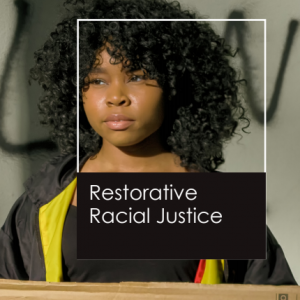 Restorative Racial Justice (Page 9)
Restorative Racial Justice (Page 9)
Justice and redemption are at the very heart of faith. Restorative justice begins with listening to and empowering communities that have been exploited, excluded and denied equal representation and freedom. The evil ideology of
white supremacy shaped our nation from its founding and continues to impact policies and communities today, especially in the criminal justice system. The killings of Ahmaud Arbery, Breonna Taylor, George Floyd and so many other Black people, Indigenous people, and other people of color, has provoked a growing, multi-racial moral movement for accountability and systemic reforms for racial justice.
Questions for Reflection and Candidates
- How can we dismantle the evil ideology of white supremacy in our culture and political systems?
- What can be done to end racial profiling and police violence against people of color?
- What steps can be taken to ensure formerly incarcerated people have voting rights and fair access to employment?
- As a candidate, what will you do to ensure racial justice is prioritized in the criminal justice system?
- How do we build safe communities for everyone, particularly people of color?
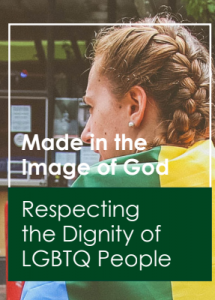 Made in the Image of God: Respecting the Dignity of LGBTQ People (Page 11)
Made in the Image of God: Respecting the Dignity of LGBTQ People (Page 11)
All people have inherent dignity because everyone is created in the image of God. Our gay, lesbian, bisexual and transgender family members, neighbors and co-workers deserve equal rights, and to live without fear or discrimination.
Questions for Reflection and Candidates
- How can your faith community more fully support the equal dignity of LGBTQ people in your state and local area?
- What are the greatest threats to LGBTQ people in your community and the nation?
- As a candidate, what are your specific plans to ensure that LGBTQ people have equal rights and are treated with dignity
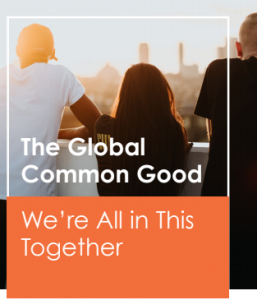 The Global Common Good: We’re All in This Together (Page 12)
The Global Common Good: We’re All in This Together (Page 12)
What does it mean to love our neighbors as ourselves in a globalized world? The health and future of our country and
communities are interconnected to the health and security of other nations. Our fates are bound up in what Rev. Martin Luther King, Jr., called “an inescapable network of mutuality.”
Questions for Reflection and Candidates
- What policies do you think are most important for creating security for your family and community?
- What role should the United States play in the world to help build global peace and security?
- How can your faith community advocate for policies to create a more peaceful world?
- As a candidate, what programs and policies would you prioritize to help build secure communities and a peaceful world?

Advocacy in the 2025 NM Legislature: Lifting Up Our Sacred Waters
/in Faithful Citizenship, Featured Articles, NEWS, NM Legislature, Sacred Land and Water /by adminBy Rev. Clara Sims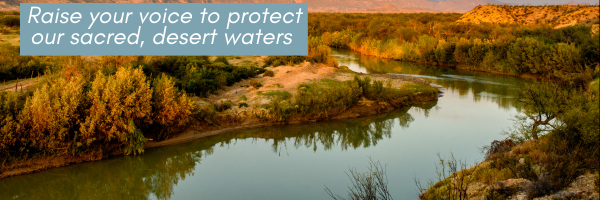
Assistant Executive Director
IPL New Mexico & El Paso
As the legislative session begins this week, we are highlighting several opportunities to advocate for a more responsible and just relationship to water — water who is among our most precious sibling and a sacred caretaker of all Creation.
The political landscape of water in New Mexico is multifaceted and complex. We extend great gratitude to organizations such as Amigos Bravos and NM Water Advocates for providing guidance and leadership for the 2025 session.
Here’s what we are paying attention to –
Governor Michelle Lujan Grisham is proposing $75 million for the Strategic Water Supply which would fund unproven and risky processes of produced water reuse from oil and gas operations, brackish water extraction, and desalinization.
Along with the undersigned 53 organizations, New Mexico & El Paso IPL shares deep concern for the implications of the Strategic Water Supply. We understand it to be a risk to public health and our already scarce freshwater resources, as well as a publicly funded subsidy for the oil and gas industry’s waste disposal problem.
Instead, we join others in asking our leaders to focus on a responsible and just path in water management through the following key areas.
Focus on funding good legislation that has already passed, like the 2023 Water Security Planning Act! In this spirit, New Mexico Water Advocates and the state appointed Water Task Force reccomend $62 million in one time appropriations in HB2 (the overarching funding bill) for the following:
Water Security Planning Act Implementation
Allocate $30 million over three years to fund the 2023 Water Security Planning Act which passed unanimously. This would fund regional water planning that is robust and based on reliable data. It would include funding grants to regions to coordinate and conduct community-driven planning to address water scarcity and prepare for reduced aquifer recharge and streamflow by identifying, vetting, and prioritizing programs, policies, and projects to improve water supply security for current and future generations of New Mexicans. This would include establishing regional water planning entities, providing grants to stand up entities, preparing work plans, and doing the work by finding dedicated staff and expert(s) help for each region.
Water Agency Modernization
Allocate $30 million over three years for the Office of the State Engineer (OSE) and the Interstate Stream Commission (ISC) to modernize their equipment, software and processes so these two offices can do their jobs more effectively, fulfilling the data-related mandate of the 2019 Water Data Act and the 2023 Water Security Planning Act outlined above.
Active Water Resource Management (AWRM)
Allocate $2 million over two years to prepare for Active Water Resource Management (AWRM) to the Middle and Lower Rio Grande for water rights enforcement — promulgate rules to implement priority administration with water banks in the Lower and Middle Rio Grande
That’s a lot of information! How can you advocate for all these moving pieces?
Start with New Mexico Water Advocates guide, which includes a pre-written letter that you can edit and send to your legislator(s) via email. If you do so, remember how powerful it is to uplift that you are writing as a person of faith and conscience!
To learn more, you can also check out NM Water Advocates speaker series focusing on these three areas of legislative action.
And wait, there’s more…
Responding to the loss in federal protections for New Mexico waterways
There are two very important bills that would create much needed state regulatory protection of our waters given our recent loss in federal protections. After the Sackett supreme court decision in 2023, over 96% of New Mexico waterways lack protection under the EPA’s Water Quality Act. Because of this decision, the group American Rivers named ALL of New Mexico’s rivers as the most endangered rivers of 2024.
Given this, we need strong state-level protections of our rivers, tributaries, wetlands, including and especially those that flow only seasonally.
The following two pieces of legislation are intended to be passed in tandem.
Water Quality Act Changes (SB 22)
Sponsored by Senator Wirth and Rep. Ortez, this first bill proposes amendments to the Water Quality Act that will enable the New Mexico Environment Department (NMED) to build a state surface water permitting program for waters no longer federally protected.
NMPDES Primacy Bill (SB 21)
Sponsored by Senator Wirth and Rep. Duhigg, this second bill will enable NMED to take primacy from EPA of the National Pollutant Discharge Elimination System surface water discharge permits. In other words, it will give the state authority to take over permitting from the EPA — thereby creating a more streamlined process and ensuring NM’s waters are managed by local experts.
To learn more, you can also check out Amigos Bravos educational fact sheet focusing on these two related bills, as well as their press release.
If you want to be kept up to date more regularly on committee hearings and additional opportunities to raise your voice for our sacred waters and more, we can add you to our advocacy list. To be added, please contact our advocacy chair Ruth Striegel (ruthstriegel@gmail.com) and our assistant director Clara Sims (clara@nm-ipl.org).
Join Us for a Forum on Water Advocacy in the Coming State Legislature
/in Faithful Citizenship, Featured Articles, NEWS, NM Legislature, Sacred Land and Water /by adminHow to Advocate for Water Funding from the NM Legislature
Sunday, January 12, 11:45
First Congregational UCC,
2801 Lomas Blvd. NE Albuquerque
(in the Music Room)
Guest Speaker Norm Gaume
President of NM Water Advocates
Norm has spent his career managing water in New Mexico and is a former director of the Interstate Stream Commission. He is now the president of NM Water Advocates, educating and organizing citizens of NM to participate in shaping our water future. He was involved n the creation of the 50-Year Water Action plan.
Contact Rev. Clara Sims, clara@nm-ipl.org for Zoom link if you can’t attend in person.
Please Contact Our Leaders to Protect The Caja del Rio
/in Earth & Faith, Faithful Citizenship, Featured Articles, NEWS /by adminA request from Rev. Andrew Black, an IPL-NM/EP board member and coordinator of Earthkeepers 360 He is also a pastor at First Presbyterian Church in Santa Fe.